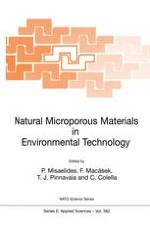1999 | OriginalPaper | Chapter
Natural Zeolites and Nuclear-Waste Management: The Case of Yucca Mountain, Nevada, USA
Author : D. L. Bish
Published in: Natural Microporous Materials in Environmental Technology
Publisher: Springer Netherlands
Included in: Professional Book Archive
Activate our intelligent search to find suitable subject content or patents.
Select sections of text to find matching patents with Artificial Intelligence. powered by
Select sections of text to find additional relevant content using AI-assisted search. powered by
The most important radionuclide migration issues at Yucca Mountain concern not 137Cs and 90Sr but anionic species and long-lived actinides that often form large, complex aqueous species. Zeolites do not interact strongly with such species, illustrating their limitations in real-world applications. Emplacement of radioactive waste will heat large volumes of rock, and zeolites will be important sources and sinks of water and thermal energy during heating and cooling in the vadose zone. In addition, dehydration/hydration reactions are accompanied by volumetric changes. Longer-term reactions, e.g., of clinoptilolite to analcime, will give rise to larger volume reductions and production of water and silica. These studies of Yucca Mountain show that the importance of zeolites extends far beyond cation exchange by zeolites to phenomena affecting the entire thermohydrologic system.
